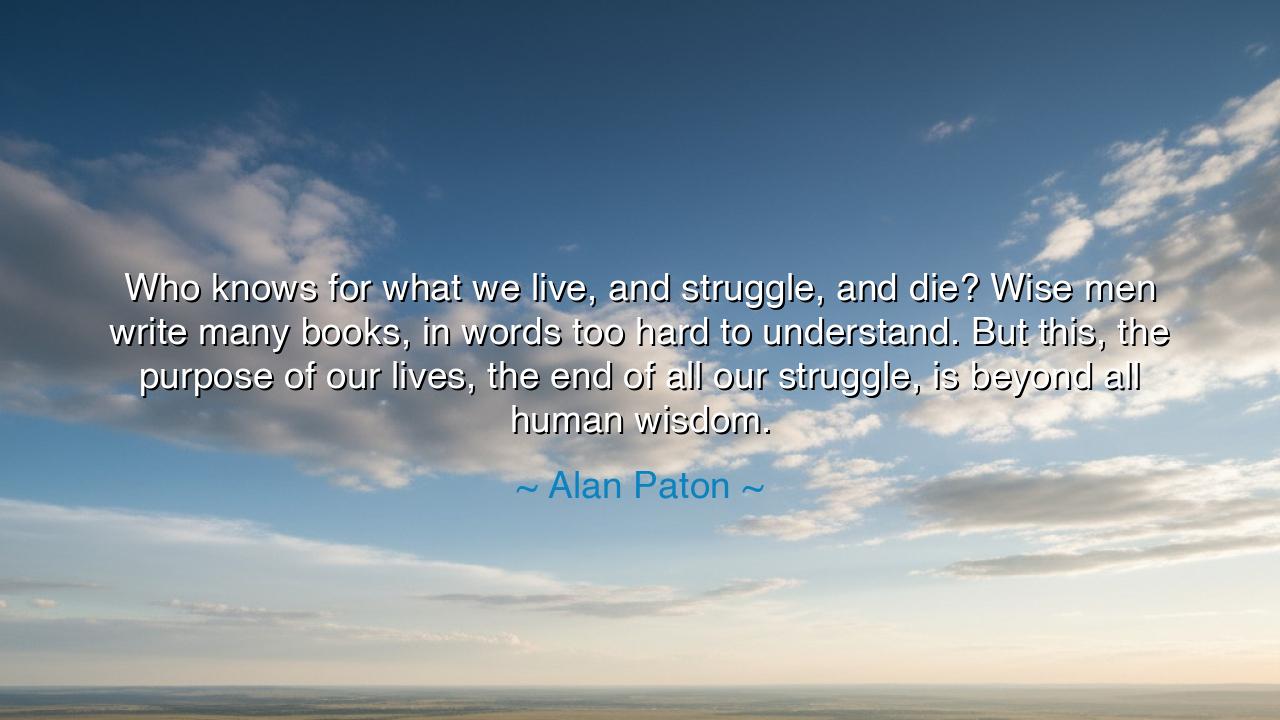
Who knows for what we live, and struggle, and die? Wise men
Who knows for what we live, and struggle, and die? Wise men write many books, in words too hard to understand. But this, the purpose of our lives, the end of all our struggle, is beyond all human wisdom.






Alan Paton, the voice of South Africa’s conscience, wrote with solemn humility: “Who knows for what we live, and struggle, and die? Wise men write many books, in words too hard to understand. But this, the purpose of our lives, the end of all our struggle, is beyond all human wisdom.” In these words he strikes at the heart of the eternal mystery. For men seek to answer life’s deepest questions with systems, with doctrines, with volumes of philosophy. Yet Paton reminds us that the ultimate purpose remains veiled, too vast for the grasp of mortal thought.
The wise men fill libraries with theories, weaving fine webs of reason and speculation. Yet no matter how intricate their words, they fall short of solving the riddle of existence. Human wisdom is finite, and though it can describe the stars, measure the seas, and chart the mind, it falters before the great question: why do we live, why do we struggle, why do we die? Paton’s confession is not despair but reverence, urging us to embrace mystery with humility.
History itself confirms this lesson. The Stoic philosophers of Rome taught discipline, the pursuit of virtue, and acceptance of fate. The Christian martyrs gave their lives for faith in something greater than reason could prove. Both reached for meaning, both sought to explain suffering and sacrifice. Yet even they admitted that the full end of our struggle lies beyond the mind of man. The greatest traditions, though clothed in wisdom, leave room for awe, for mystery, for the divine silence that reason cannot break.
Paton himself, who lived through the anguish of apartheid, knew intimately the question of suffering. He saw people live, struggle, and die for freedom, for dignity, for justice. Yet even he, a man of deep faith and fierce moral clarity, acknowledged that the final purpose of all this striving was hidden beyond human sight. His words carry the weight of one who has seen injustice, yet still believes that life holds meaning deeper than human systems can explain.
O children of tomorrow, hear this teaching: do not despise the mystery, nor demand from life an answer too small for its greatness. Walk humbly, love deeply, struggle nobly, even if the purpose lies beyond your understanding. For the end of all striving is not to know, but to live faithfully in the face of the unknown. Paton’s voice calls across the ages: the riddle of life may be beyond human wisdom, but the beauty of living, struggling, and dying with love remains within our grasp.






MLHUYNH THUY MY LINH
This quote makes me question the limits of human intellect and language. Can the most profound truths of life ever be captured in words, or is understanding something experiential rather than intellectual? I wonder whether the attempt to articulate life’s purpose through books and philosophy is ultimately symbolic, helping us navigate existence even if the true end remains hidden. Could acknowledging our limitations deepen our appreciation for life’s moments and struggles?
PVPhung Vu
I feel a mix of awe and existential tension reading this quote. It seems to suggest that human striving may have intrinsic value even if the ultimate reason remains unknown. Does this imply that our search for purpose is itself meaningful? I’d like to explore whether accepting the unknowability of life’s ultimate aim can liberate us from unrealistic expectations or whether it leads to nihilism. How do we find balance?
DHNguyen Duc Hieu
This statement makes me reflect on the nature of struggle and mortality. If the purpose of life is beyond comprehension, how do we reconcile our ambitions and desires with this uncertainty? I’m curious whether the human need to write, teach, and philosophize is a way to cope with the anxiety of not knowing. Could embracing mystery be a more honest approach than clinging to complex theories that attempt to explain everything?
TNNguyen Hoang Thien Nhi
I find this thought deeply existential. It raises questions about the role of philosophy, religion, and art in human life. Are these attempts to bridge the gap between our limited understanding and the unknowable purpose? I wonder whether humans are wired to seek meaning even when it might be unattainable. Could accepting that some questions have no answers lead to a more peaceful, less frustrated way of living?
VPBui Van Phong
Reading this, I feel both humbled and unsettled. It suggests that even the greatest thinkers cannot fully explain why we live and suffer. Does this mean that meaning is inherently subjective, and each person must create their own purpose? I’m curious about how this perspective might affect morality, motivation, or resilience. If the ultimate purpose is beyond human comprehension, how should we approach our daily struggles and ambitions?